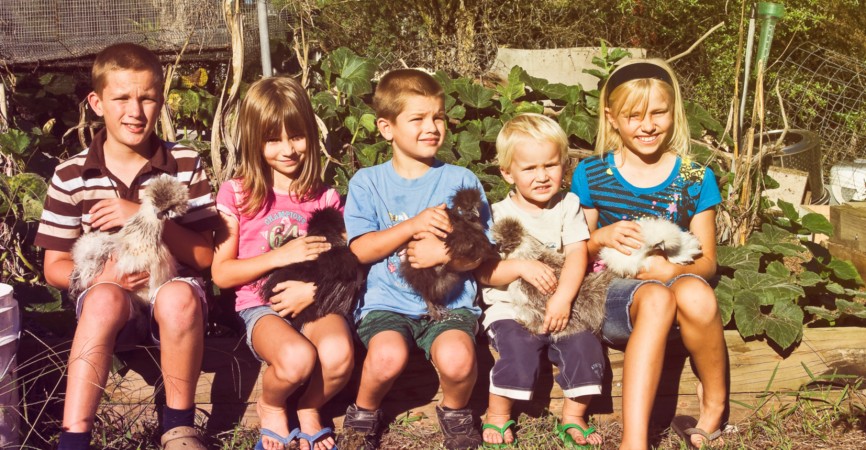
Chooks For Kids
Megg Miller says chooks make fantastic pets for children. All mum and dad need to do is choose the right chook breed and the love affair can begin!
Featherbrained or not, chooks make great pets for children. They’ll endure being carried around, taken for rides on the bike or put to sleep in the doll’s pram. At the end of all of this they’ll go off and lay eggs for your next breakfast.
Chooks are the ideal pet for introducing kids to responsibility. If pet hens are not fed, their egg output drops. If the henhouse isn’t locked up at night, a sad pile of feathers may be all that’s left come morning. Chooks help kids to accept the realities of life.
Choosing a breed
So which breeds are best? It’s going to vary depending on the child’s age. Littlies will gain confidence from a docile breed like the Silkie or the Pekin. They’re small-bodied fowls, they show little inclination to fly and don’t mind being petted and patted. A bonus is the choice of colours available.
Youngsters of lower primary school age might prefer more active birds, and two breeds that are easy to tame are Wyandottes and Australian Langshan. Size-wise, miniatures would suit best, and both these breeds are reasonable layers.
Modern Game bantams have loads of character that an older child would enjoy. They’re unusual looking, long-legged and very elegant and as bright as a button. The Indian Game bantam is short and stocky and looks almost reptilian but it also has a great personality. Both of these could be carried around in a jacket pocket, although the Indian is a big fellow so would probably prefer a customised bag.
If a pretty bird is preferred an Ancona takes the prize. This breed is a bit flighty by nature, but these birds quieten readily, are spectacular looking and produce a white-shelled egg. Either bantam or a full-size fowl would be suitable.
Another breed that merits inclusion is the Faverolles. It is sweet natured but not very smart so it needs looking out for. Faverolles have a beard and muffs and lots of foot feathers, so they can get pretty dirty. However, they are ideal for a suburban backyard. Be warned though, they are quite a weight to carry around and they have a reputation for slipping through the backdoor and pottering around the kitchen.
Does size matter?
It is the bird’s temperament that really counts but size has to be considered. Some bantams are too bouncy and active for kids and many large fowls would be too big to handle comfortably. Try to match size of bird to the child.
Roosters – sorry!
Pet roosters are definitely out; even the most placid bird will either become bored and nasty or overly protective of his hens. Roosters can inflict serious injuries so have no place around children.
Cats & Dogs
Cats will prey on little chickens but generally lose interest once they grow and start developing feathers. Keep a watchful eye on puss the first couple of times the kids play with the fowls or when the birds free-range, especially if you decide on Modern Game bantams. They are not much bigger than a magpie!
Dogs that haven’t been raised around poultry are not trustworthy. If the chooks get a fright and run, pooch is likely to chase them and bad habits can develop. Don’t take chances – keep the dog well secured when the children and chooks are playing.
Games & Fun
Teach the chooks to ride around on the edge of the wheelbarrow or a pram, even to hang onto the handlebars of your bike. Or you could train them to jump up on command and take a piece of bread out of your hand. They will follow you when called and will chase after objects like grapes.
Chooks learn quickly but you do need to be patient and offer lots of rewards as you work with them. You can even teach them to respond verbally – chook talk – which is really amusing.
Chooks will readily accompany their owner in the car and so can go on holiday or even to school for the day. (But what about poo? Lots of tissues are required!)
Feeding Chooks
Yes, they love party cake, chips and even the odd lolly but these items are not nutritious enough to build strong chickens and help hens lay. Don’t give them saveloys – they make chooks ill. Mixed grains or pellets must be provided plus green feed to make the yolks golden.
Rules for kids:
No chasing chooks.
No teasing.
Never carry birds upside down by their feet.
Never leave small children unattended around chooks.
Cover arms and legs before handling chooks in case of scratches.
Ensure ‘duty of care’ is understood and that infringements carry loss of privileges.


